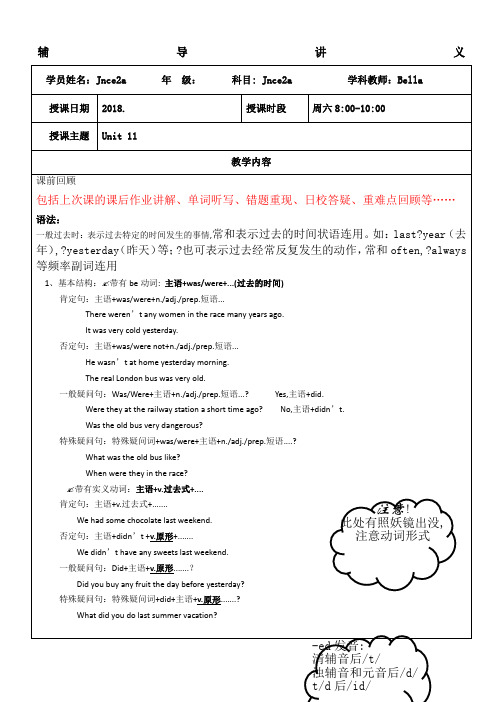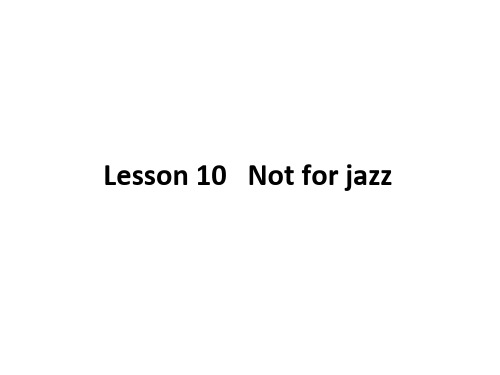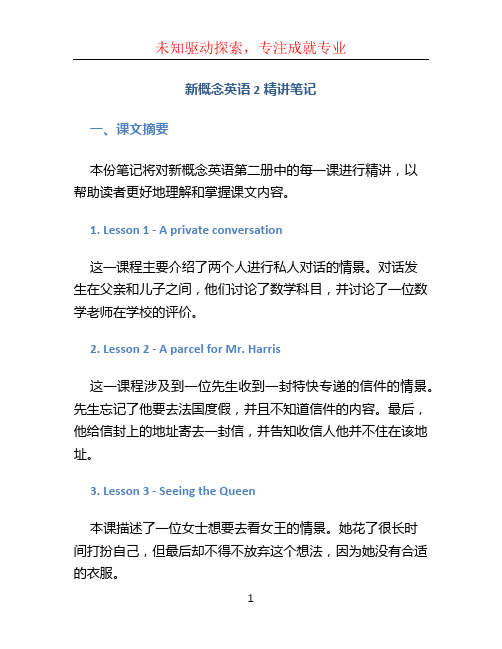NCE2新概念2册 lesoon10精讲笔记
新概念第二册笔记Lesson 1 -- Lesson 10

新东方新概念第二册笔记Lesson 1 -- Lesson 10 NEW CONCETP ENGLISH BOOK 2prachice :训练,progress :进步if you practise more ,then you can make great progress.五项综合训练技能listening:听力speaking:说话grammar :语法writing :写作reading :阅读以人心比人心translation :译knowledges,skills§ Lesson oneA private conversation私人谈话【NEW WORDS AND EXPRESSIONS】生词和短语★private adj.私人的it's my private letter/house ;private school:私立学校public:公众的,公开的public school ;public letter 公开信;public place :公共场所privacy:隐私it's a privacy. adj.《Private Ryan》private soldier:大兵private citizen 普通公民private life:私生活★conversation n.谈话subject of conversation:话题talk.可以正式,也可以私人的conversation. 比较正式一些let's have a talkThey are having a conversation.conversation 用的时候比talk正式,意思上往往不非常正式.talk:可正式可不正式dialogue:对话China and Korea are having a dialogue. 正式chat: 闲聊gossip:嚼舌头have a + talk/chat/dialogue/conversation/gossip 名词变动词★theatre n.剧场,戏剧cinema: 电影院★seat n.座位have a good seat(place)take a seat : 座下来,就座take your seat/take a seatIs the seat taken? 这个座位有人吗?no/yessit sit down ,pleaseseat take your seat,pleasebe seated,please 更为礼貌seat是及物动词,后面有宾语sit是不及物动词,后面不加宾语seat后面会加人; seat sb; seat him; seat:让某人就座sit he is sitting there.you seat him;〖语法精粹〗4.When all those present(到场者)_D_ he began his lecture.(重点题)A.sitB.setC.seatedD.were seaedsit,sit down; seat,be seated;take a seat★play n.戏★loudly adv. 大声的★angry adj. 生气的cross=angry ; I was angry.He was cross.annoyed: 恼火的;I was annoyed.I was angry/cross.I was very angry.be blue in the face; I am blue in the face.★angrily adv. 生气的副词修饰动词★attention n. 注意Attention ,please. 请注意pay attention :注意pay attention to : 对什么注意You must pay attention to that gril.pay a little attention :稍加注意pay much attention :多加注意pay more attention :更多注意pay no attention :不用注意★bear(bore,borne) v. 容忍bear,standI can't bear/stand youendure :忍受,容忍put up with :忍受I got divorced.I could not put up with himbear/stand/endure忍受的极限在加大put up with=bear=standbear n.熊white bearbear hog :热情(热烈)的拥抱give sb a bear hug★business n. 事business man :生意人do business: 做生意go to some place on business:因公出差I went to Tianjin on business.thing 可以指事情,也可以指东西It's my business 私人事情it's none of your business★rudely adv. 无礼地,粗鲁地rude adj.【TEXT】Last week I went to the theatre. I had a very good seat. The play was very interesting. I did not enjoy it. A young man and a young woman were sitting behind me. They were talking loudly. I got very angry. I could not hear the actors. I turned round. I looked at the man and the woman angrily. They did not pay any attention. In the end, I could not bear it. I turned round again. "I can't hear a word!" I said angrily."It's none of your business," the young man said rudely. "This is a private conversation!"参考译文上星期我去看戏。
新概念二Lesson 10 知识点整理

Lesson 10 Not for jazz 不适于演奏爵士乐学习目标全解必记单词jazz n. 爵士音乐musical adj. 音乐的instrument n. 乐器clavichord n. 古钢琴recently adv. 最近damage v. 损坏key n. 琴键string n. 弦,细绳shock v. 使震惊allow v. 允许,让touch v. 触摸常考短语be made in (a country) 产自于…belong to 属于allow sb. to do sth. 允许某人做某事a friend of my father’s 我父亲的一个朋友经典句型1.It is called a clavichord.2.It was made in Germany in 1681.3.It has belonged to our family for a long time.4.Recently it was damaged by a visitor.5.My father was shocked6.We are not allowed to touch it.7.It is being repaired by a friend of my father’s.重点语法一、被动语态被动语态结构为:be+done注意:1)被动语态的时态由be的变化来表示2)只有动作是及物动词才能构成被动语态3)强调动作是由什么人或什么东西而发出时,常用介词“by+行为发出者”4)被动语态没有将来进行时态常出现的被动语态的各种时态形式如下:一般时态进行时态完成时态现在amis doneareamis being donearehavebeen donehas过去wasdonewerewasbeing donewerehad been done重点语法将来shallbe donewillshallhave beendonewill过去将来shouldbe donewouldshouldhave beendonewould例句:1.Our milk is delivered every morning. (一般现在时)2. A new bridge is being built outside my house by workers.(现在进行时)3.That boy has been punished by the headmaster.(现在完成时)二、名词的属格(一)名词所有格的构成1. 单数名词,在词尾加“’s”:my sister’s friend (我姐姐的朋友)2. 复数名词:1)不以-s或-es结尾的特殊变化的复数名词,在词尾加“’s”The Children’s Day 儿童节2)以-s结尾的复数名词,在词尾加“’”构成所有格Her friends’ money 她朋友们的钱3. 复合名词在最后一个词的词尾加“’s”my father-in-law’s company 我岳父的公司4. 对于由and连接的并列名词,当表示共有的情况下,只需在最后一个名词词尾加“’s”; 若表示各自所有,则需在每个名词词尾加“’s”。
青少版新概念2A unit 10 知识点总结

-ed 发音: 清辅音后/t/浊辅音和元音后/d/ t/d 后/id/辅 导 讲 义学员姓名:Jnce2a 年 级: 科目: Jnce2a 学科教师:Bella 授课日期 2018. 授课时段周六8:00-10:00授课主题 Unit 11教学内容课前回顾包括上次课的课后作业讲解、单词听写、错题重现、日校答疑、重难点回顾等……语法:一般过去时:表示过去特定的时间发生的事情,常和表示过去的时间状语连用。
如:last?year (去年),?yesterday (昨天)等;?也可表示过去经常反复发生的动作,常和often,?always 等频率副词连用1、基本结构:✍带有be 动词: 主语+was/were+...(过去的时间)肯定句:主语+was/were+n./adj./prep.短语...There weren ’t any women in the race many years ago. It was very cold yesterday.否定句:主语+was/were not+n./adj./prep.短语... He wasn ’t at home yesterday morning. The real London bus was very old.一般疑问句:Was/Were+主语+n./adj./prep.短语...? Yes,主语+did. Were they at the railway station a short time ago? No,主语+didn ’t. Was the old bus very dangerous?特殊疑问句:特殊疑问词+was/were+主语+n./adj./prep.短语....? What was the old bus like? When were they in the race? ✍带有实义动词:主语+v.过去式+....肯定句:主语+v.过去式+.......We had some chocolate last weekend. 否定句:主语+didn ’t +v.原形+.......We didn ’t have any sweets last weekend. 一般疑问句:Did+主语+v.原形.......?Did you buy any fruit the day before yesterday? 特殊疑问句:特殊疑问词+did+主语+v.原形.......? What did you do last summer vacation?注意!此处有照妖镜出没,注意动词形式2、动词过去式变化规则:1)一般情况下,动词词尾加-ed, 如:work—worked? play—played? want—wanted? ask—asked2)以不发音的-e结尾动词,动词词尾加-d, 如:live—lived? move—moved? taste—tasted3)以“辅音字母+y”结尾的动词,把y改成i, 加—ed, 如:study—studies? try—tried? copy—copied? carry—carried4)重读闭音节动词,双写词尾辅音字母,再加—ed, 如:stop—stopped5)常用不规则动词过去式am,is, was have hadare were do dideat ate go wentgive gave read readfeel felt come camebuy bought fly flewdrive drove ride rodeput put sell soldsee saw get gotsit sat hang hungbring brought become becamebreak broke take tookcut cut meet metleave left say saidrun ran tell toldsleep slept write wrotewin won find found1.?I?_________?(have)?an?exciting?party?last?weekend.?2.?_________?she?_________(practice)?her?guitar?yesterday???????No,?she?_________.?3.?What?________?Tom?________?(do)?on?Saturday?evening??He?________(watch)?TV?and?__________(read)?an?interesting?book.4.?They?all?_________(go)?to?the?mountains?yesterday?morning.?5.?She?_________(not?visit)?her?aunt?last?weekend.?She?________?(stay)?at?home?and?_________(do)?some?cleaning.6. Jenny喜欢看书。
新概念英语第二册语法精讲-Lesson10

新概念英语二-----------------LESSON 10重点词组:belong to 属于for a long time 有很多年了many years ago 很多年前try to 试着做…two of ……中的两个be allowed to do 被允许做…a friend of my father’s 我爸爸的一个朋友语法点:1. instrument常用的意思是器械、器具,尤指医疗、机器等方面的,但也可以用来泛指各种乐器e.g.: Does he learn an instrument? 他学乐器了吗?2. call有把……称为的意思,既可用于主动语态,也可用于被动语态e.g.: They call him big Tom. 他们叫他“大个子汤姆”。
有打电话的意思e.g.: My mum called me yesterday. 我妈妈昨天给我打电话了。
3. belong为不及物动词,因此不能用于被动语态。
它是一个表示状态的动词,而不是行为动词,所以不能用于进行时。
最常用的时态是一般现在时和一般过去时e.g.: This farm belongs to me. 这个农场属于我。
重点语法------ 被动语态语态有两种,主动语态和被动语态。
主语是动作的发出者为主动语态;主语是动作的接受者为被动语态。
e.g.: The cat caught the mouse. (主动语态)The mouse was caught by the mouse. (被动语态)被动语态基本构成:be donea) 一般现在时:主语+ am/is/are done.b) 一般过去时:主语+ was, were+being done.c) 一般将来时:主语+ will /be going to+be done.d) 现在进行时:主语+am/is/are+being+done.e) 现在完成时:主语+ have/has+been done.f) 情态动词:主语+ can/could/may/must/should+be done.※补充:1. 若宾语补足语是不带to 的不定式,变为被动语态时,该不定式前要加"to"。
新概念英语第二册lesson10剖析讲解

课文讲解
3、She tried to play jazz on it! play n. 玩,演奏(乐器等) ① 跟球类连用, 直接+球类; ② 跟乐器连用, +the+乐器, 演奏乐器而非
7、 key n. 琴键 ① n. 琴键 ② n. 钥匙,答案 key to the door 门钥匙 Do you know the key to the question? ③ adj. 关键的 key structure
8、 shock v. 使不悦或生气, 震惊
① v. 使不悦或生气, 震惊。 跟人的情绪有关的动词的宾语
• string n. (乐器的)弦
• shock v. 使不悦或生气,震惊
• allow v. 允许,让
• touch v. 触摸
1 、jazz n. 爵士音乐
a kind of music
2、 musical adj. 音乐的
musical student 有音乐天赋的人 music student 学音乐的人(the student who learned music)
3、 instrument n. 乐器
instrument = musical instrument
instrument 常用的意思是“器械”、“
器具”,尤指医疗、机器等方面的。也可 用来泛指各种乐器。
4、clavichord n. 古钢琴, (不是现代的piano)
a kind of instrument
参考译文 我家有件古乐器, 被称作古钢琴, 是1681年德国造的. 我们的
这架古钢琴存放在起居室里. 我们家有这件乐器已经很久了, 是 我祖父在很多年以前买的. 可它最近被一个客人弄坏了, 因为她 用它来弹奏爵士乐. 她在击琴键时用力过猛, 损坏了两根琴弦. 我 父亲大为吃惊, 不许我们再动它. 父亲的一个朋友正在修理这件 乐器。
新概念英语2精讲笔记

新概念英语2精讲笔记一、课文摘要本份笔记将对新概念英语第二册中的每一课进行精讲,以帮助读者更好地理解和掌握课文内容。
1. Lesson 1 - A private conversation这一课程主要介绍了两个人进行私人对话的情景。
对话发生在父亲和儿子之间,他们讨论了数学科目,并讨论了一位数学老师在学校的评价。
2. Lesson 2 - A parcel for Mr. Harris这一课程涉及到一位先生收到一封特快专递的信件的情景。
先生忘记了他要去法国度假,并且不知道信件的内容。
最后,他给信封上的地址寄去一封信,并告知收信人他并不住在该地址。
3. Lesson 3 - Seeing the Queen本课描述了一位女士想要去看女王的情景。
她花了很长时间打扮自己,但最后却不得不放弃这个想法,因为她没有合适的衣服。
4. Lesson 4 - A trip to Australia这一课程讲述了一个家庭计划去澳大利亚旅行的故事。
然而,悲剧发生了,火车撞上了他们的汽车,所以他们不得不取消他们的旅行。
5. Lesson 5 - The best and the worst本课程介绍了一个学生在考试中取得了最佳成绩的情景,然而,与此同时,他在体育课上却表现糟糕。
6. Lesson 6 - No parking这一课程讲述了一个人找不到停车场的情景。
他每次都被告知停车场已满,最后他决定去别处停车。
7. Lesson 7 - A card from Jimmy故事中的Jim写了一张卡片给Tom,并且任性地说他不会和Tom一起度过假期。
最后,Jim明白了自己的错误,并且表示他确实会和Tom一起度过假期。
8. Lesson 8 - Dreaming课文描述了一个人做梦的情景。
他梦见自己在一个美丽的地方,但醒来后他发现自己只是躺在家里的床上。
9. Lesson 9 - A pleasant dream这一节课是关于一个人做了一个愉快的梦的情景。
新概念第二册课文翻译及学习笔记【Lesson10、11、12】

新概念第二册课文翻译及学习笔记【Lesson10、11、12】课文内容:Not For JazzWe have an old musical instrument. It is called a clavichord. It was made in Germany in 1681. Our clavichord is kept in the living-room. It has belonged to our family for a long time. The instrument was bought by my grandfather many years ago. Recently it was damaged by a visitor. She tried to play jazz on it! She struck the keys too hard and two of the strings were broken. My father was shocked. Now we were not allowed to touch it. It is being repaired by a friend of my father's.本文参考译文:我们有一件古老的乐器,叫击弦古钢琴.它是1681年德国制造的, 我们这架钢琴放在客厅里.我们家拥有它很长时间了,这件乐器是很多年前我祖父买来的.最近它被一位客人弄坏了,她用它弹奏爵士乐! 她按键太猛,把两根弦按断了.我父亲为之震怒. 现在他不允许我们再碰它.父亲的一位朋友正在修理这件古老的乐器.词汇:jazz n.爵士音乐musical a.音乐的instrument n.器具call vt.叫做clavichord n.击弦古钢琴Germany n.德国keep vt.保存living-room n.客厅belong vi.属于recently ad.最近damage vt.损坏play vt.弹奏key n.琴键strike vt.敲hard ad.重重地string n.弦break vt.弄断shock vt.震惊touch vt.碰allow vt.允许repair vt.修理Lesson 11—One good turn deserves another课文内容I was having dinner at a restaurant when Tony Steele came in. Tony worked in a lawyer's office years ago, but he is now working at a bank. He gets a good salary, but he always borrows money from his friends and never pays it back. Tonysaw me and came and sat at the same table. He has never borrowed money from me. While he was eating, I asked him to lend me &20. To my surprise, he gave me the money immediately. 'I have never borrowed any money from you,' Tony said,'so now you can pay for my dinner!'【生词和短语】turn n. 行为,举止deserve v. 应得到,值得lawyer n. 律师bank n. 银行salary n. 工资immediately adv. 立刻课文注译1、One good turn deserves another.这是句谚语,意思是对于别人的善意或协助应作相对应的回报。
新概念英语二经典语法讲解Lesson10

新概念英语二经典语法讲解Lesson10 New Concept English 新概念经典语法讲解Lesson 10 Not for jazz1.We have an old musical instrument. 我家有件古乐器。
instrument常用的意思是“器械”、“器具”,尤指医疗、机器等方面的。
但它可以用来泛指各种乐器。
2.It is called a clavichord. It was made in Germany in 1681.被称做古钢琴,是1681年德国造的.(1)call “把?称为”、“称呼” 既可用于主动语态,也可用于被动语态: a. What do you call this? 你们把这称为什么? b. They call him big Tom. 他们叫他“大个子汤姆”。
(2) make动词经常用于被动语态。
当它与不同的介词搭配时,意义也稍有不同。
? made in可表示产地或时间:a. This bike was made in China. 这辆自行车是中国造的。
b. It was made in 1988. 它生产于1988年。
? made of表示用其中一种材料制成(通常指制造后不改变该材料原来的性质或形状): a. This chair is made of wood. 这椅子是木制的。
made from表示用数种材料制成,或者是制造后改变了材料原来的性质或形状(看不出原料/多种原料):a. Paper can be made from wood. 用木材可以造纸。
? made by表示由谁制造:a. This skirt was made by Mary. 这条裙子是玛丽做的。
翻译训练:我的车是美国制造的;顾晗,你不必客气,可以随时用它。
belong为不及物动词,因此不能用于被动语态。
另外,它是一个表示状态的动词,而不是行为动词,所以它也不能用于进行时。
- 1、下载文档前请自行甄别文档内容的完整性,平台不提供额外的编辑、内容补充、找答案等附加服务。
- 2、"仅部分预览"的文档,不可在线预览部分如存在完整性等问题,可反馈申请退款(可完整预览的文档不适用该条件!)。
- 3、如文档侵犯您的权益,请联系客服反馈,我们会尽快为您处理(人工客服工作时间:9:00-18:30)。
3
) shock 震惊 : I was shocked when I heard about your car accident. 当我听到你开车出事后, 我非常震惊。
Allow v. 允许,承认
【同】permit 【反】forbid
【补充学习】
) allow sb. to do sth.强调 人的主观能动性,允许某人 去做某事: I allow my baby to creep around in the room. 我允许 宝宝在房间里四处爬。
3)
shock震惊: The bad news left us all speechless from shock, 这一坏消息使我们震惊得 说不出话。
V. 使震惊,震动
【辨】worry, surprise, shock 1 ) worry 担心 : I always worry about my mother's health.我总担 心着我妈妈的身体状况。 2) surprise 惊奇 : His anger surprised me.他的愤怒使我很惊 讶。
Lesson 10 Not for jazz
不适于演奏爵士乐
New words and expressions
jazz
n.爵士音乐 【补充学习】pop music流 行音乐; country music乡村 音乐; classical music古典音 乐;light music 轻音乐; rock and roll摇滚乐;blues 忧郁的蓝调音乐
2)
call off (=cancel, delete )取消 :
The
next outdoor meeting has been called off. 下次的户外会议被取消了。
3)
call for需要;要求; 值得:
The occasion calls for a cool head. 这种场合需要冷静的头脑。
clavichord
n.古钢琴(并 不是想象中的老钢琴,它 构造较简单,发音单调, 远不如钢琴悦耳)
recently adv. 最近
【同】lately 【补充学习】recent
adj. 近来的, 最新的; recentness n. 最近
v.破坏 【同】harm, hurt, impair
Question: What happened to the clavichord?
To后面加宾语,表示其身上发生
了什么事,即动作的目标、对象。 What happened to you?
你怎么了?(在你身上发生了什
么事?)
1.
We have an old musical instrument. 参考翻译 我们有一个 古乐器。
teacher is called Bill. 我们称老师为比尔。 China is called a kingdom of bicycles. 中国被称为“自行车王国”。
语言点2 call 的常用短语
1
) call on拜访,看望: I shall call on my teacher tomorrow,明天我将去看 望我的老师
1
2
) allow doing 不强调人, 而强调可以做某事:
allow smoking and spitting only in limited areas. 吐痰。
We
我们只允许在指定的地点吸烟、
Touch
v.
触摸,碰:
Visitors
are not allowed to touch the exhibits. 参观者请勿触摸展览品。
标题 Not for jazz 总结 for 的用法
1
) 为: I bought a book for you. 我为你 买了一本书
2)
因为: Something fell in, for I heard a splash.一定有东西掉 下去了,因为我听见 扑通一声。
3)适合:
Not for jazz = It's not suitable to play jazz on the clavichord. 古钢琴不适合演奏爵 士乐。
Damage
key n.
1)键盘key-keyboard; 2)钥匙key-door;
3)答案key-question; 4)重点
shock n. 震惊
【辨】w 1 ) worry 担心: The worry showed on her face.她 看起来很担心。 2) surprise惊奇 : I gave my mother a big surprise. 我给了我妈妈一个很大的惊喜。
2.
It is called a clavichord. 参考翻译 它被叫做古 钢琴。
语言点1 call 的用法:
call sb. sth.把某 人叫做……: Please call me Bill. 请叫我比尔。
1)
2)
sb. /sth. be called (被动语态):
Our
4)
n.
触,碰;少许,一点:
Even
the slightest touch will break it. 即使轻轻一碰也会把它弄破。
【搭】1)touch down飞行 器着陆,触地得分; a touch of sth. 一点儿,少许: a touch of salt少许盐;a touch of mustard 一点儿芥 末;keep in touch 保持联系 (常用于口语)
Musical adj.音乐的
【补充学习】music
音乐; musician 音乐家; musical student 有音 乐天赋的学生
Musical composer 音乐作曲家 singer 歌手
Instrument n.工具,仪表;乐 器:
string
instrument 弦乐 器; pipe instrument管 乐器; percussion instrument 打击乐器
